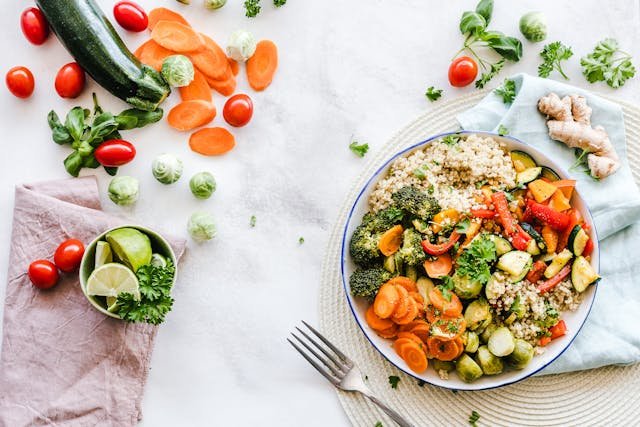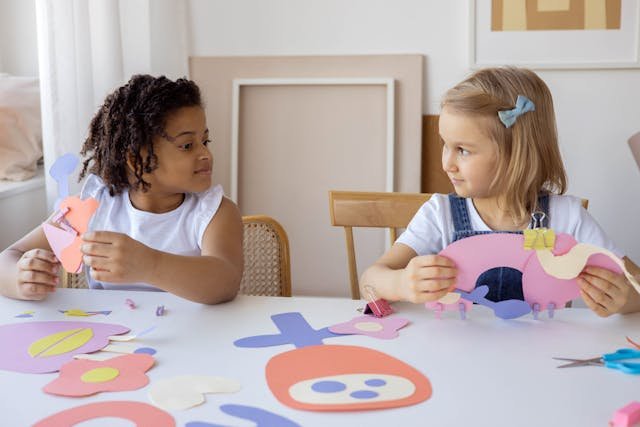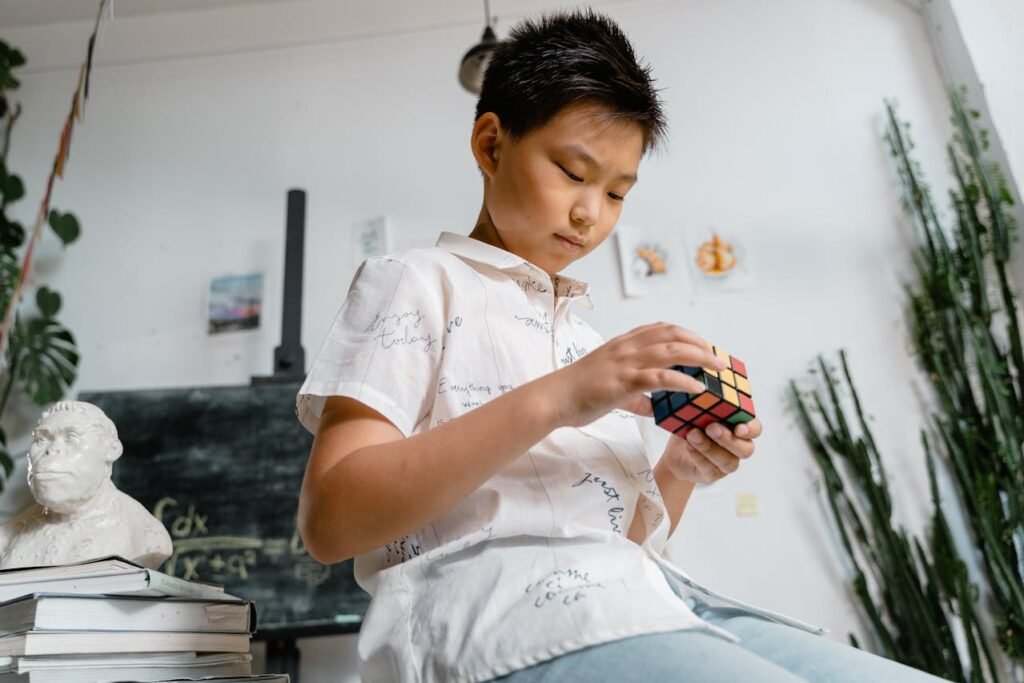When we think about food, most of us picture energy for the body — running, playing, or growing taller. But food does more than fuel muscles. It also fuels the brain. The meals a child eats every day have a powerful effect on how well they think, focus, and learn.
Cognitive skills — things like memory, attention, problem-solving, and creativity — depend on a healthy brain. And just like a car needs the right fuel to run smoothly, the brain needs the right nutrients to work at its best. A diet rich in certain foods can sharpen focus, strengthen memory, and boost overall learning ability. On the other hand, poor nutrition can make children feel tired, distracted, or less able to process new information.
At Debsie, we see this link clearly. Children who eat balanced meals often show more focus in class, more patience with challenges, and more confidence in their thinking. Those who skip meals or rely on sugary snacks may struggle to keep up, not because they lack ability, but because their brains are running on the wrong kind of fuel.
Why the Brain Needs Good Food
Let’s take a closer look at how food and the brain are connected — and why this really matters, especially for kids and teens.
Think of your brain as the boss of your whole body. It tells your heart to beat, your lungs to breathe, and your hands to move. But that’s not all. It also helps you:
- Think clearly
- Solve problems
- Understand new things
- Remember what you learned
- Make decisions
- Stay calm and balanced
But here’s the secret: your brain can only do all that well when it’s fed properly.
The Brain is Always Working — Even When You’re Not
Your brain never takes a break. Even when you’re asleep, it’s sorting out your memories and helping you rest. That’s why it needs more energy than almost any other part of your body. In fact, even though your brain is small, it uses about 20% of the energy from the food you eat.
So, what happens if it doesn’t get the right fuel?
It’s like trying to run a race without shoes… or trying to read a book in the dark. The brain can still work, but it struggles.
You might notice:
- It’s harder to focus during lessons.
- You forget things you just learned.
- You feel sleepy or lazy even if you slept well.
- You get annoyed or upset more easily.
- You feel sad for no clear reason.
That’s why feeding your brain the right food is one of the most important things you can do every single day.
Good Food Helps You Learn Better
Kids and teens are learning so much every day. New words, new math rules, science facts, history stories, computer skills — it never stops. But here’s the thing: learning isn’t just about listening in class or doing homework. Learning needs a healthy brain.
A well-fed brain can:
- Take in new information faster
- Solve tricky problems with less stress
- Remember facts for longer
- Speak and write more clearly
- Ask better questions
- Be more creative
That means when a student eats well, they don’t just feel better — they learn better too. And over time, this can really add up.
Good Food Also Helps with Big Feelings
Let’s not forget emotions. The brain also controls how we feel. If you’ve ever felt grumpy, anxious, or down after skipping a meal or eating too much sugar, you’ve already seen how food affects mood.
Certain foods help the brain make “happy chemicals” — like serotonin and dopamine. These are the ones that help us feel calm, focused, and joyful. Without the right foods, those chemicals can drop, and we start to feel off-balance inside.
So the right food doesn’t just feed your brain — it feeds your feelings too.
What Happens When Kids Eat Junk Food All the Time?

Junk food is everywhere. Chips, cookies, soda, instant noodles, candy bars, fried snacks — they’re colorful, tasty, and very easy to grab when you’re hungry. And let’s be honest — they can feel like a treat sometimes.
But here’s the problem: when kids eat too much junk food, and not enough healthy food, it can cause some serious problems for their growing brains and bodies.
Let’s break it down.
1. Junk Food Affects Memory and Learning
Many junk foods are full of sugar, salt, and unhealthy fats. These might taste good, but they don’t give the brain the nutrients it needs to think clearly.
Over time, this can lead to:
- Trouble focusing in class
- Forgetting things easily
- Struggling to keep up with lessons
- Getting bored or distracted quickly
It’s like trying to do your homework while someone keeps turning the lights off and on. Your brain wants to work — but it’s not getting the right support.
2. Sugar Rush, Then Sugar Crash
Have you ever seen a child get really hyper after eating candy or soda? That’s a sugar rush. It gives a quick burst of energy, but it doesn’t last.
After a while, the sugar levels in the blood drop quickly, and then comes the crash:
- The child feels tired, moody, or even upset.
- It becomes harder to think or stay awake.
- They may get irritable or start crying for no reason.
This up-and-down cycle is tough for the brain. It confuses the body and makes it harder to stay balanced.
3. Junk Food Can Affect Mood and Behavior
Too much junk food doesn’t just make the brain slow — it can also make emotions harder to manage.
Why?
Because the brain makes mood chemicals from the food we eat. When we eat food with no real nutrients, the brain struggles to make those chemicals.
That means kids might:
- Feel anxious or nervous for no clear reason
- Get angry faster than usual
- Struggle to stay calm or focused
- Feel sad or lonely, even if nothing is wrong
Over time, this can lead to bigger emotional challenges.
4. Poor Diet Can Harm Sleep
Kids who eat lots of junk food, especially late in the day, often have trouble sleeping well. And poor sleep makes everything worse.
- The brain doesn’t get enough rest.
- Kids wake up tired and grumpy.
- Focus, memory, and learning all drop even more.
Healthy food helps with healthy sleep. Junk food — especially sugary or fried snacks — often makes sleep shallow or broken.
5. The Body Also Gets Affected
Let’s not forget: the brain and body are connected. If the body feels heavy, weak, or bloated from junk food, the brain doesn’t work well either.
Kids who eat too much junk food may also:
- Get sick more often (weaker immune system)
- Feel low on energy during the day
- Gain too much weight or lose muscle
- Have trouble keeping up in physical activities or sports
It’s not about being skinny or strong — it’s about feeling good in your own body, and helping it do what it’s meant to do.
Brain-Boosting Foods Every Kid Should Eat

Feeding the brain isn’t about fancy diets or expensive foods. It’s about giving the brain the tools it needs to grow strong, stay focused, and feel happy. Luckily, many of the best foods for the brain are easy to find and super tasty!
Here’s a deeper look at what to include on your plate:
1. Eggs – The Memory Builder
Eggs are full of choline — a special nutrient that helps build memory and supports brain growth. Kids who eat eggs regularly may find it easier to remember things at school.
Ways to enjoy:
- Scrambled eggs for breakfast
- Boiled eggs in lunch boxes
- Omelets with spinach or cheese
Eggs are simple, affordable, and full of power. They also keep kids full for longer, which helps with focus in class.
2. Fish – The Focus Friend
Fish like salmon, sardines, tuna, and mackerel are rich in omega-3 fatty acids — which are like special oils that help the brain stay sharp.
Benefits:
- Better focus and attention
- Faster thinking
- Happier mood
Not all kids love fish at first, but making it tasty (grilled, in wraps, or with rice) can help. Just one or two servings per week can make a difference.
If fish isn’t possible, foods like chia seeds, flaxseeds, and walnuts also have omega-3s!
3. Berries – The Tiny Brain Protectors
Berries — like blueberries, strawberries, and blackberries — are like little shields for the brain. They’re full of antioxidants, which protect brain cells from damage and help with memory.
Easy ways to eat:
- Add to yogurt or cereal
- Make smoothies
- Eat frozen ones as snacks
Plus, berries are naturally sweet, so they’re a smart alternative to candy.
4. Leafy Greens – The Alert-Makers
Greens like spinach, kale, broccoli, and lettuce may not be every kid’s favorite, but they are packed with vitamins like A, C, and K, plus iron and folate — which help kids stay alert and think clearly.
They also:
- Boost energy levels
- Help with blood flow to the brain
- Support mood and calmness
To make them fun, try:
- Adding spinach to pasta sauce
- Making veggie nuggets
- Blending into smoothies with banana
You don’t need a mountain of greens — just a handful here and there makes a big difference.
5. Whole Grains – The Energy Givers
Whole grains like brown rice, whole wheat bread, oats, and quinoa give the brain slow and steady energy. This helps kids stay focused for longer — no energy crashes like after eating sugar.
These grains:
- Keep tummies full
- Help with steady thinking
- Support good mood and learning
Choose whole-grain versions of food your child already eats — like bread, cereal, or pasta.
6. Nuts and Seeds – The Smart Snack
Tiny but mighty, nuts and seeds are full of healthy fats, protein, and brain-boosting nutrients like zinc, magnesium, and vitamin E.
They help:
- Improve memory
- Calm anxiety
- Support learning
Good options include:
- Almonds
- Walnuts
- Sunflower seeds
- Pumpkin seeds
You can blend them into nut butters, sprinkle them on fruit or yogurt, or enjoy them plain.
7. Fruits – The Natural Brain Sugar
Fruits like bananas, oranges, apples, and mangoes give natural sugars that energize the brain — without the crash that comes with candy or soda.
Plus, they’re full of vitamins and fiber, helping digestion and mood.
Try:
- Banana with peanut butter
- Apple slices with cinnamon
- Fruit salad with honey and lemon
8. Water – The Most Important One
Water isn’t a food, but it’s just as important. When kids don’t drink enough water, their brains slow down. They may feel:
- Tired
- Moody
- Dizzy
- Unfocused
So remind kids to sip water during the day — especially when they’re studying, playing, or it’s hot outside.
Tip: Add lemon, cucumber, or berries to water to make it fun and flavorful!
Each of these foods doesn’t just feed the brain — it teaches the brain to think better, feel better, and grow better.
How to Build Smart Eating Habits for a Sharper Brain

Knowing what to eat is the first step. But making it a habit? That’s where the real magic happens. Let’s go over some easy, actionable ways families can make brain-friendly eating part of everyday life — without stress, guilt, or strict rules.
1. Make One Small Change at a Time
Start slow. Don’t try to change everything at once. Instead of cutting out all junk food, add more good food first.
Try this:
- Add a boiled egg to breakfast.
- Pack an apple instead of a cookie.
- Replace soda with fruit-infused water.
These small wins build confidence — for both kids and parents.
2. Involve Kids in Meal Choices
When kids help choose what they eat, they’re more likely to enjoy it. Let them:
- Pick a new fruit at the store
- Help stir the soup or chop veggies (with help)
- Choose a fun name for a healthy snack (“brainy banana bites”)
When food is fun, kids forget it’s “healthy” — they just enjoy it.
3. Keep Healthy Snacks Ready
Hunger always wins — especially during homework time or after school. If junk food is easier to grab than healthy food, guess what kids will reach for?
Try preparing:
- A bowl of washed berries in the fridge
- Small boxes of nuts or seeds
- Whole wheat crackers with hummus
- Banana or apple slices with nut butter
Make smart snacks easy, and kids will choose them more often.
4. Be a Role Model
Kids copy what adults do — not just what they say. If they see you drinking water, eating fruit, or saying “yum!” to veggies, they’ll be more curious to try it too.
You don’t have to be perfect. Just show them that you try — and that food can be both tasty and good for the brain.
5. Don’t Use Food as a Reward or Punishment
Saying things like “you can have cake if you finish your vegetables” teaches kids that veggies are bad and sweets are better.
Instead, try:
- Celebrating new foods (“You tried broccoli! That’s awesome!”)
- Making healthy foods part of happy moments (fruit platters at birthdays!)
Let food be about joy, not pressure.
6. Eat Together When Possible
Even if it’s just one meal a day, eating together as a family helps kids build a better relationship with food. It’s also a good time to:
- Talk about what’s on their plate
- Share stories from school
- Slow down and enjoy food, not just rush through it
This calm setting helps the brain digest better too!
These habits don’t just help kids eat well now — they help shape how they think, feel, and make choices as they grow older. And that’s the real goal, right? A strong brain and a healthy mindset.
Brain and Food: What Kids Need at Different Ages

The brain goes through huge changes as kids grow. From learning to walk and talk to solving math problems and writing stories — every stage needs different kinds of support. That’s why what we feed kids at each stage really matters.
1. Toddlers (Ages 1–3) – Building the Brain Foundation
At this age, kids are just learning to talk, move, and understand the world. Their brains are like sponges — soaking up everything.
What they need:
- Full-fat dairy like yogurt and milk – helps with brain growth.
- Eggs and fish – supports memory and speech development.
- Fruits and veggies – builds strong nerves and helps the brain connect faster.
At this stage, offering a variety of textures, colors, and tastes builds a strong base for lifelong healthy habits.
2. Preschoolers (Ages 4–6) – Growing Minds
This is when kids ask “why?” a lot. Their brain is working fast — learning numbers, shapes, words, and even emotions.
Helpful foods:
- Whole grains for steady energy all day
- Berries and oranges for memory and thinking speed
- Leafy greens and carrots to help their eyes and brain stay sharp
Kids this age love finger foods. Make veggies fun by cutting them into stars or hearts. Playful food gets eaten faster!
3. Young School-Age (Ages 7–10) – Learning and Focusing
Now kids are in classrooms, learning bigger ideas — reading, writing, solving problems, working with others. Focus becomes super important.
Smart foods to include:
- Nuts and seeds – help with memory and staying calm
- Bananas and apples – great brain snacks between school and homework
- Protein-rich meals – like chicken, eggs, tofu, or lentils to build strong brain connections
And don’t forget hydration — a bottle of water during school hours helps more than you think.
4. Pre-Teens (Ages 11–13) – Changing Brains and Bodies
This is the start of puberty. Kids may grow quickly, get mood swings, and need lots of sleep. The brain is being “rewired” to prepare for adulthood.
Important foods:
- Iron-rich foods like spinach, beans, and lean meat – helps with thinking and energy
- B-vitamins from whole grains and eggs – supports brain cell function
- Healthy fats from avocado, nuts, and fish – protect the brain as it develops
This age also brings more peer pressure and independence. It’s a good time to teach them how to make smart food choices on their own.
5. Teens (Ages 14–18) – The Final Brain Boost
The teen brain is almost adult-sized, but it’s still developing. Decision-making, emotional control, and planning skills are still forming.
What they need:
- Omega-3s from fish or flaxseed – sharpens thinking and supports mental health
- Plenty of protein – builds brain chemicals for focus and calm
- Magnesium and zinc from leafy greens, pumpkin seeds, and beans – help with stress and sleep
Many teens skip meals or eat lots of junk on the go. But this is the time they need real fuel the most.
Every stage is important. And feeding the brain well from the start helps build kids who are not only smart — but also calm, confident, and ready to take on the world.
How Diet Can Help With Focus, Memory, and Mood

Many kids today face challenges in school — they may struggle to pay attention, remember things, or manage big feelings. While these problems can have many causes, what a child eats plays a big role. Let’s look at how the right foods can help with focus, memory, and mood in a big way.
Helping Kids Focus Better
Focus is the ability to stay on one task without getting distracted. But for many kids, this can be tough. They may try to listen in class but find their minds drifting. Others may start a project but leave it halfway done.
One reason for this is poor nutrition. If kids eat too much sugar or skip meals, their brain doesn’t get the steady energy it needs. They might feel jumpy one minute, then sleepy the next.
The good news is that focus can be improved with food. Starting the day with a protein-rich breakfast — like eggs, yogurt, or nuts — gives the brain fuel that lasts. Adding whole grains at lunch, such as brown rice or oats, provides slow energy. And having smart snacks like fruit and seeds during study time can help keep their mind sharp all day.
Boosting Memory and Brain Power
Memory is how the brain stores and remembers things — like a math rule or the name of a country. But if a child’s brain doesn’t get the right nutrients, it becomes harder to remember what they’ve learned.
Kids with poor diets might find themselves forgetting simple instructions, mixing up facts, or feeling like they have to relearn the same things over and over again.
To boost memory, it’s important to give the brain the nutrients that help it grow strong. Berries, such as blueberries and strawberries, protect brain cells. Leafy greens like spinach help with mental clarity. Fish, like salmon or tuna, contains healthy fats that help the brain make new connections faster.
With regular intake of these foods, children often find it easier to remember lessons and recall them when needed — whether in class, at home, or during exams.
Supporting Emotional Control
Food doesn’t just affect how kids think. It also affects how they feel. Have you ever noticed that a child gets cranky or moody when they’re hungry? That’s not just behavior — that’s the brain reacting to low energy.
When kids eat too much junk food or skip meals, their emotions can swing up and down like a rollercoaster. They might be cheerful one moment, then upset the next. Sometimes, they cry easily or get angry over small things.
Balanced meals help bring balance to emotions. A mix of protein, healthy carbs, and good fats helps the body and brain stay stable. Breakfast is especially important — it gives a calm start to the day. Foods rich in magnesium, like oats, bananas, or seeds, can also help children feel less anxious and more at ease.
Reducing Brain Fog and Tiredness
Some children seem tired even when they’ve had a full night’s sleep. They say things like, “I can’t think clearly,” or “My head feels heavy.” This is often called brain fog — and food might be the cause.
Brain fog can happen when the brain doesn’t get enough oxygen or hydration. Without enough iron in the diet, the body can’t carry oxygen to the brain. This makes kids feel slow, weak, and confused. Iron-rich foods like spinach, beans, eggs, and lentils can help solve this.
Dehydration is another cause of foggy thinking. Many kids forget to drink water throughout the day. Simply drinking enough clean water — especially during school or homework time — can bring their brain back to life and help them feel alert again.
Conclusion: Small Bites, Big Brains
We often think of food as something that fills our tummy. But the truth is, it fills our brain first. Every bite we eat has the power to help us think faster, feel calmer, and learn better.
For children and teens, this is especially important. Their brains are still growing — learning how to solve problems, manage emotions, and make decisions. The right food helps them do all of that, and more.
The best part? You don’t need a perfect diet. Just small, smart changes. Add an egg to breakfast. Choose water over soda. Swap a bag of chips for a handful of nuts or fruit. These tiny steps, done every day, build up to something powerful — a brain that’s healthy, happy, and ready to shine.
At Debsie, we believe that learning isn’t just about books and tests. It’s about building whole, healthy minds. That’s why we support not just academic growth, but also life growth — focus, patience, smart thinking, and real confidence.
Ready to help your child grow smarter — one meal and one lesson at a time?
👉 Join a free class at Debsie today and let’s build brilliant brains together.
Read Next:



